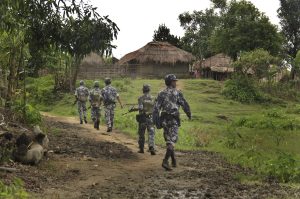This piece is a first-person account from a Rohingya who works for Doctors Without Borders (MSF) in Myanmar. The author’s name is being withheld for safety reasons.
In 2003, I was being treated for malaria by MSF in my home village in Maungdaw township, Rakhine state. As they nursed me back to health, I was amazed to hear about the lifesaving work MSF was doing throughout northern Rakhine.
I decided to work for MSF, starting out as a Rohingya language translator in MSF’s mobile clinics, before working as a health educator. Nearly 18 years later, I now set up and run mobile clinics like the one that treated me all those years ago.
A lot has changed in Rakhine state during my time with MSF. I watched tensions grow between Rakhine and Rohingya communities in the wake of the deadly violence that erupted in 2012 and the campaign of targeted violence waged against the Rohingya in 2017, which forced mass displacement. Today, I fear for the future of my community and country under Myanmar’s dehumanizing, segregated system, but I see a chance for change as people’s perspectives on the Rohingya slowly begin to shift.
In June 2017, I was working in a village in Maungdaw when I first heard stories of the Arakan Rohingya Salvation Army (ARSA), providing military training in the mountains. Just two months later the MSF clinic where I worked was burned to the ground amid a brutal crackdown, ostensibly in response to attacks by the ARSA on police and military posts.
I saw houses burning with my own eyes. I saw the smoke billowing from the embers of Rohingya communities in downtown Maungdaw. At night I heard gunshots from all directions. I watched people fleeing Myanmar, crossing the Naf river into Bangladesh.
We packed our bags, preparing to leave, but water levels were precariously high due to the August rainy season, and I did not want to drown with my family, so we decided to stay.
Over 100 members of my family, including my parents and sisters, did leave, however. They now live in camps in Cox’s Bazar, Bangladesh. I have not seen my mother since April 2017.
What of the Rohingya’s ancestral lands, from which we were driven?
There is nothing left of the Rohingya villages that were burned down. All traces of the people who lived there have been scrubbed from existence. Where trees have not reclaimed the land, the government has built border guard camps and settlements for other ethnic groups.
I saw a newly built, fenced-in encampment with guard towers at each corner, filled with prefabricated container homes in northern Maungdaw. This is the home waiting for any Rohingya brave enough to return.
All the MSF community health workers who worked in my village are now in Bangladesh. Of our four clinics in Maungdaw, three have been burned down. We were not able to restart our work in northern Rakhine until September 2018, and even then, our services were much reduced. Our mobile clinics only began again in April 2019 in neighboring downtown Buthidaung.
I feel sad when I drive past where the villages used to be, where we used to provide health services. It is unbelievable to see this land, which used to be so full of life and activity, now desolate.
There is no hope for my family and colleagues to return to Myanmar any time soon. My country is now led by the same military responsible for the 2017 campaign of destruction against my people. Across Rakhine state more than 100,000 Rohingya remain imprisoned in squalid camps, reliant on the support of humanitarian organizations like MSF.
We are still denied basic human rights and freedoms. We cannot travel freely to find work or seek healthcare. We need permission to marry and struggle to register our newborn children.
There have been some improvements in relations between Rakhine and Rohingya communities. When conflict broke out between the Arakan Army, an ethnic Rakhine armed group, and the Myanmar military in 2019, ethnic Rakhine communities also experienced the violence and scorched earth tactics of the military. This shared experience has helped to rebuild trust between Rohingya and Rakhine groups, particularly among younger generations. Friends who chose to ignore me in the street after 2012 are now greeting me again when we pass. They are inviting me to their homes.
Since the military seized power this year and used widespread violence to quash pro-democracy rallies across Myanmar, there has been a shift in how people think about the Rohingya. Protesters have posted on social media and held aloft signs at rallies apologizing for not recognizing the suffering of Rohingya and for failing to stand up when atrocities were committed against us.
Myanmar’s government-in-exile, the National Unity Government, has announced plans to abolish the 1982 law that denied us citizenship and appointed the first ever Rohingya human rights adviser, U Aung Kyaw Moe, to the parallel government.
On the fourth anniversary of the 2017 atrocities, they pledged to seek justice for “all crimes committed by the military against Rohingya” and to make safe repatriation a priority.
We must wait to see how this shift will impact us. We want to live peacefully alongside all communities, but under the current system our future is uncertain, and our fears remain.

































